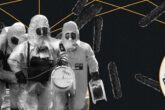Nations around the world are investing in artificial intelligence (AI) to improve their military, intelligence, and other national security capabilities. Yet AI technology, at present, has significant safety and security vulnerabilities. AI systems could fail, potentially in unexpected ways, due to a variety of causes. Moreover, the interactive nature of military competition means that one nation’s actions affect others, including in ways that may be detrimental to mutual stability. There is an urgent need to explore actions that can mitigate these risks, such as improved processes for AI assurance, norms and best practices for responsible AI adoption, and confidence-building measures that improve stability among all nations.
CNAS is leading a center wide, multi-year initiative on artificial intelligence. This effort examines the national security risks and opportunities of AI. CNAS experts deliver concrete, actionable recommendations to inform U.S. and allied policymaking.
Learn More:
Artificial Intelligence Safety and Stability
Nations around the world are investing in artificial intelligence (AI) to improve their military, intelligence, and other national security capabilities. Yet AI technology, at...
CNAS AI Governance Forum
Artificial intelligence has catapulted into the public consciousness, sparking excitement and fear. Tech companies and investors are pouring billions into generative AI, and g...
Subscribe:
Stay in the loop with updates from the Technology and National Security team at CNAS.
Highlights
-
AI and the Evolution of Biological National Security Risks
New AI capabilities may reshape the risk landscape for biothreats in several ways. AI is enabling new capabilities that might, in theory, allow advanced actors to optimize bio...
By Bill Drexel & Caleb Withers
-
Catalyzing Crisis
The arrival of ChatGPT in November 2022 initiated both great excitement and fear around the world about the potential and risks of artificial intelligence (AI). In response, s...
By Bill Drexel & Caleb Withers
-
Future-Proofing Frontier AI Regulation
Executive Summary Policymakers should prepare for a world of significantly more powerful AI systems over the next decade. These developments could occur without fundamental b...
By Paul Scharre
















